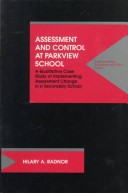Understanding Education & Policy
1 total work
Schools are a prominent part of contemporary society's formal organisation of education. The overriding expectation on education is to provide the young person with the tools to be successful in a dynamically ever changing world. As society changes so, too, does society's expectations of schools. State-maintained institutions, dependent on the state for their survival, are subject to the prevailing beliefs and values that drive the economic, political and educational systems through which society is organised. This interpretive study investigates the process of implementation of externally imposed educational change. It's central core is a finely detailed empirical case study that offers insights into the meaning of educational change by coming to an understanding of the ideologies, values and attitudes of key participants - a group of teachers who reveal why they act the way they do when faced with management directives to make changes to their professional working practices. The theme of the book is articulated by the question that weaves through the study: how do individuals manage to retain a sense of freedom with constraints imposed on them?
The approach adopted shares the perspective known as policy ethnography which stresses the problematic nature of implementation, viewing it as an active process whereby individuals engaged in the act of implementation interpret, reinterpret, reform and reconstruct the policy ideas when actively putting them into practice or into use.
The approach adopted shares the perspective known as policy ethnography which stresses the problematic nature of implementation, viewing it as an active process whereby individuals engaged in the act of implementation interpret, reinterpret, reform and reconstruct the policy ideas when actively putting them into practice or into use.
